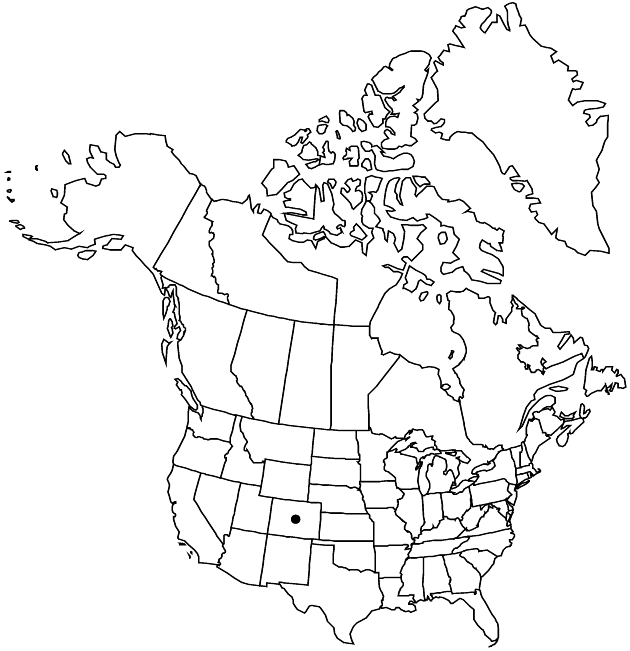Difference between revisions of "Lygodesmia grandiflora var. doloresensis"
Rhodora 95: 399. 1993.
FNA>Volume Importer |
imported>Volume Importer |
||
| (3 intermediate revisions by 2 users not shown) | |||
| Line 8: | Line 8: | ||
}} | }} | ||
|common_names=Dolores River skeletonplant | |common_names=Dolores River skeletonplant | ||
| + | |special_status={{Treatment/ID/Special_status | ||
| + | |code=E | ||
| + | |label=Endemic | ||
| + | }} | ||
|basionyms={{Treatment/ID/Basionym | |basionyms={{Treatment/ID/Basionym | ||
|name=Lygodesmia doloresensis | |name=Lygodesmia doloresensis | ||
|authority=Tomb | |authority=Tomb | ||
| + | |rank=species | ||
|publication_title=Syst. Bot. Monogr. | |publication_title=Syst. Bot. Monogr. | ||
|publication_place=1: 48, fig. 49. 1980 | |publication_place=1: 48, fig. 49. 1980 | ||
| Line 30: | Line 35: | ||
|distribution=Colo. | |distribution=Colo. | ||
|discussion=<p>Of conservation concern.</p><!-- | |discussion=<p>Of conservation concern.</p><!-- | ||
| − | --><p>Variety doloresensis is distinguished by its much-branched stems, almost filiform leaves, and smooth cypselae. It is known only from the Dolores River valley and is similar to < | + | --><p>Variety doloresensis is distinguished by its much-branched stems, almost filiform leaves, and smooth cypselae. It is known only from the Dolores River valley and is similar to <i></i>var.<i> dianthopsis</i>, which is distinguished by being less branched and by having broader leaves.</p><!-- |
--><p>Variety doloresensis is in the Center for Plant Conservation’s National Collection of Endangered Plants.</p> | --><p>Variety doloresensis is in the Center for Plant Conservation’s National Collection of Endangered Plants.</p> | ||
|tables= | |tables= | ||
| Line 40: | Line 45: | ||
-->{{#Taxon: | -->{{#Taxon: | ||
name=Lygodesmia grandiflora var. doloresensis | name=Lygodesmia grandiflora var. doloresensis | ||
| − | |||
|authority=(Tomb) S. L. Welsh | |authority=(Tomb) S. L. Welsh | ||
|rank=variety | |rank=variety | ||
| Line 54: | Line 58: | ||
|publication title=Rhodora | |publication title=Rhodora | ||
|publication year=1993 | |publication year=1993 | ||
| − | |special status= | + | |special status=Endemic |
| − | |source xml=https:// | + | |source xml=https://bitbucket.org/aafc-mbb/fna-data-curation/src/2e0870ddd59836b60bcf96646a41e87ea5a5943a/coarse_grained_fna_xml/V19-20-21/V19_597.xml |
|tribe=Asteraceae tribe Cichorieae | |tribe=Asteraceae tribe Cichorieae | ||
|genus=Lygodesmia | |genus=Lygodesmia | ||
Latest revision as of 20:53, 5 November 2020
Plants (solitary) 15–30 cm. Stems erect, much branched proximally, weakly striate proximally. Leaves: proximal blades linear-filiform, 30–140 × 1–3 mm; distal similar. Heads 2–5, borne singly. Involucres subcylindric, 18–20 × 4–5 mm, apices narrow. Phyllaries 5. Florets 5; corollas lavender, rose, or white. Cypselae 18 mm, abaxial faces smooth, adaxial weakly rugose bisulcate with ridge separating sulci. 2n = 18.
Phenology: Flowering Jun.
Habitat: Alluvial soil in Juniper grassland
Elevation: 1300–1500 m
Discussion
Of conservation concern.
Variety doloresensis is distinguished by its much-branched stems, almost filiform leaves, and smooth cypselae. It is known only from the Dolores River valley and is similar to var. dianthopsis, which is distinguished by being less branched and by having broader leaves.
Variety doloresensis is in the Center for Plant Conservation’s National Collection of Endangered Plants.
Selected References
None.
